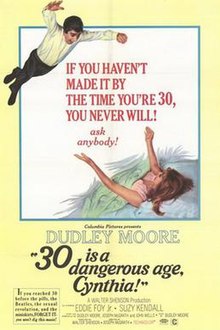30 Is a Dangerous Age, Cynthia
| 30 Is a Dangerous Age, Cynthia | |
|---|---|
 | |
| Directed by | Joseph McGrath |
| Written by | Dudley Moore Joseph McGrath John Wells |
| Produced by | Walter Shenson |
| Starring | Dudley Moore |
| Cinematography | Billy Williams |
| Edited by | Bill Blunden |
| Music by | Dudley Moore |
Production company | Walter Shenson Productions |
| Distributed by | Columbia Pictures |
Release date |
|
Running time | 86 minutes |
| Country | United Kingdom |
| Language | English |
30 Is a Dangerous Age, Cynthia (also known as Thirty Is a Dangerous Age, Cynthia) is a 1968 British romantic comedy film directed by Joseph McGrath and starring Dudley Moore, Eddie Foy, Jr. and Suzy Kendall.[1][2]
Plot[edit]
London jazz pianist and aspiring composer Rupert Street is looking to have a 30th birthday to remember, marriage on the big day, but lacks a bride, and in the six weeks that remain, he has set himself the no less formidable additional target of writing a musical, all through fear of reaching that grand age having achieved nothing in life. Luck comes Rupert's way in the form of the gorgeous but taken Louise, a fellow boarder, whose attentions he pursues with all his goofy and inept might and main. The inevitable bust-up with competing suitor Paul leaves Rupert with right arm in plaster and unable to play.
Seeing the need of freedom from distraction, Rupert departs for Dublin. Industry and inspiration abound and Rupert returns to London triumphant having met his deadline. Odds of achieving the other half of his plan look remote, though, as Louise has left for Birmingham with the persistent Paul and Rupert must go in pursuit if he is to be married in the few days remaining till his birthday.
Meanwhile, pressures from the production's major investor on Rupert's agent to lock up his creative work in a contract amendment send private eye Greenslade to Birmingham to hunt down the hunter. Reunited by Greenslade on Rupert's birthday, the couple rush back to London for the opening, via the marriage registry, that is.
Cast[edit]
- Dudley Moore as Rupert Street
- Eddie Foy, Jr. as Oscar
- Suzy Kendall as Louise Hammond
- John Bird as Herbert Greenslade
- Duncan Macrae as Jock McCue
- Patricia Routledge as Mrs. Woolley
- Peter Bayliss as Victor
- John Wells as Honorable Gavin Hopton
- Harry Towb as Mr. Woolley
- Jonathan Routh as Captain Gore-Taylor
- Ted Dicks, Jr. as Horst Cohen
- Nicky Henson as Paul
- Clive Dunn as doctor
- Frank Thornton as registrar
- Derek Farr as TV announcer
- Micheál MacLiammóir as Irish storyteller
Critical reception[edit]
The Monthly Film Bulletin wrote: "Dudley Moores' exceptional gifts as a comedian and a musician are poorly served by the frantic direction of Joseph McGrath's film; and the leaden script – assembled rather than written by Moore, the director and John Wells – is little more than a collection of mildly diverting television sketches bound together by the thinnest of romantic plots. The constant injection of burlesque fantasy – Moore appearing as Beethoven, Mozart, Bach and Valentino amongst others – only highlights the paucity of the basic material, while Moore's endless repertoire of funny voices and facial contortions proves no substitute for a closely timed comic performance. Similarly, the repeated pans, wipes, jump cuts and bizarre montages that mark McGrath's direction prove no substitute for genuine style but merely underline the inadequacies of the script. Like Dudley Moore, most of the highly talented cast deserve something better than this."[3]
The Radio Times Guide to Films gave the film 3/5 stars, writing: "This is one of those 1960s oddities, with everyone rushing around being breezily neurotic as nightclub musician Dudley Moore panics at the thought of imminently turning 30. Moore basically plays himself, even fronting his real-life jazz trio, and it works enjoyably enough, with Suzy Kendall suitably kooky and charming as the girl he chases. Not a movie that has aged with any dignity, but of the there are considerably worse examples of "swinging" celluloid than this."[4]
Leslie Halliwell said: "Mild star vehicle for a very mild star, basically a few thin sketches, frantically overdirected."[5]
References[edit]
- ^ Leonard Maltin. Leonard Maltin's Movie and Video Guide. Plume, 1994.
- ^ Renata Adler (5 March 1968). "Movie Review: 30, a Dangerous Age". The New York Times. Retrieved 17 April 2016.
- ^ "30 Is a Dangerous Age, Cynthia". The Monthly Film Bulletin. 35 (408): 184. 1 January 1968 – via ProQuest.
- ^ Radio Times Guide to Films (18th ed.). London: Immediate Media Company. 2017. p. 928. ISBN 9780992936440.
- ^ Halliwell, Leslie (1989). Halliwell's Film Guide (7th ed.). London: Paladin. p. 1016. ISBN 0586088946.
External links[edit]
- 30 Is a Dangerous Age, Cynthia at IMDb
- 30 Is a Dangerous Age, Cynthia at Rotten Tomatoes
- 30 Is a Dangerous Age, Cynthia then-and-now location photographs at ReelStreets
